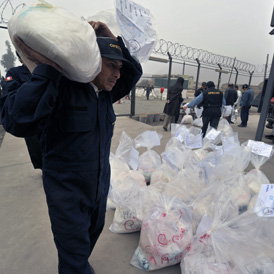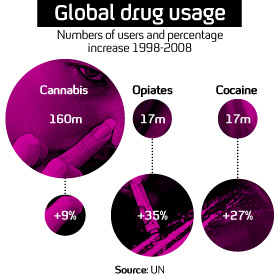War on drugs ‘not working’
The war on drugs has failed, according to a report by a group of politicians, former presidents and dignitaries, who are now calling for some drugs to be legalised.
<!–
–> <!–
–>

Commission panel members include Greek Prime Minister George Papandreou, former UN Secretary General Kofi Annan, and former US Secretary of State George Schultz.
‘Blanket prohibition’
Transform Drug Policy Foundation founder Danny Kushlick told Channel 4 News that decriminalising drugs will save money and save lives by offering people treatment rather than prison.
“What we’ve done is basically gifted one of the lagest commodities on earth to criminals. The supply needs to be taken away from criminals and put back in the hands of government to regulate,” Mr Kushlick said.
He told Channel 4 News that decriminalising drugs is unlikely to see a spike in drug use. But he said data shows that stricter penalties do not deter users.
We’re still spending $100bn a year to fight the drugs war – money that sadly only adds to the problem. Danny Kushlick, Transform Drug Policy Foundation
“There’s strong evidence that the level of policing doesn’t significantly affect levels of use. For example, in the UK we have much stronger enforcing than in countries like the Netherlands, but the level of drug use and misuse is much higher.
“We have a policy of blanket prohibition on drugs globally over the last 50 years, and that’s driven by a large extent by the US.”
But Mr Kushlick said that the US is showing some of the most obvious signs that the war on drugs is failing.
“The US has 5 per cent of the world’s population, but 25 per cent of the world’s prison population.
“They’re also feeling it from Mexico – not only the tens of thousands of deaths but the direct effect on border control.”
‘Essential relationship’
The US and UK leaders have in the past both shown the will to change drug policies. Before becoming US President, Barack Obama branded the war on drugs “an utter failure”, while in 2002 David Cameron called for discussions at the UN on alternative drug policies.
Mr Kushlick says that it will take years to overhaul drug policies.
“Things are changing but it’ll still take years to fundamentally shift policy.
“And we’re still spending $100bn a year to fight the drugs war – money that sadly only adds to the problem.
“But the possibility of reforms towards more effective and humane alternatives does exist and it’ll gain more validity as it becomes more mainstream.”

Celebrities call for decriminalisation
Dame Judi Dench and Sir Richard Branson are among more than 30 high-profile figures who have sent an open letter to the Prime Minister, calling for “the immediate decriminalisation of drug possession”.
Sir Richard urged David Cameron to look at “alternative, regulated approaches” to drugs.
“The war on drugs has failed to cut drug usage,” he said. “We need more humane and effective ways to reduce the harm caused by drugs.”
A Home Office spokesman said the Government has “no intention” of liberalising drug laws.
“Drugs are illegal because they are harmful – they destroy lives and cause untold misery to families and communities.”
He added: “Those caught in the cycle of dependency must be supported to live drug free lives, but giving people a green light to possess drugs through decriminalisation is clearly not the answer.
“We are taking action through tough enforcement, both inland and abroad, alongside introducing temporary banning powers and robust treatment programmes that lead people into drug free recovery.”
Today’s report comes as Justice Secretary Kenneth Clarke plans to divert more people with drug problems away from prison and into treatment as part of a “rehabilitation revolution”.